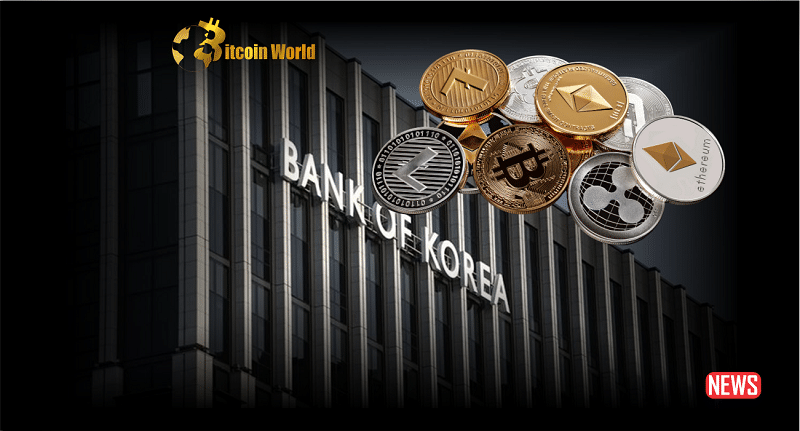The world of cryptocurrency in South Korea is about to get a little more regulated. Imagine a scenario where the nation’s central bank gets a closer look at the ins and outs of crypto businesses. Well, that’s precisely what’s happening! The Bank of Korea (BoK) has just been granted the authority to ramp up its surveillance of cryptocurrency service providers and issuers, marking a significant development as the country continues to shape its virtual asset laws. Let’s dive into what this means and why it matters.
Why the Increased Scrutiny?
For a while now, the Bank of Korea has been vocal about the potential risks that cryptocurrencies, particularly stablecoins, pose to financial stability. Think of stablecoins as cryptocurrencies designed to maintain a stable value, often pegged to a fiat currency like the US dollar. The BoK’s concern stems from the potential for these digital assets to disrupt traditional financial systems if not properly monitored. Now, they’ll have the power to delve deeper into the transaction data of cryptocurrency exchanges, giving them a clearer picture of the landscape.
BoK vs. FSC: A Tug-of-War for Crypto Control
Interestingly, this move comes amidst an ongoing debate between the Bank of Korea and the Financial Services Commission (FSC), South Korea’s primary financial regulator. Both entities have been vying for greater influence over the regulation of the burgeoning digital asset sector. While the BoK will now have the power to request transaction data, the FSC will ultimately hold the reins when it comes to setting the rules of the game. It’s a bit like having two cooks in the kitchen, both with different ideas about the recipe!
What Powers Does the BoK Now Have?
Here’s a breakdown of the key takeaways regarding the Bank of Korea’s newfound authority:
- Access to Transaction Data: The BoK can now request and analyze transaction data directly from cryptocurrency exchanges. This provides crucial insights into the flow of digital assets.
- Oversight of Crypto Businesses: The central bank has the green light to probe the operations of cryptocurrency-related enterprises, giving them a more comprehensive understanding of the industry’s players and practices.
- Focus on Financial Stability Risks: The primary driver behind this increased authority is the BoK’s concern about the potential financial stability risks associated with stablecoins and other cryptocurrencies.
The Road to Virtual Asset Legislation
This development is expected to accelerate the implementation of South Korea’s long-awaited virtual asset legislation. Politicians like Kim Han-gyu, who spearheaded the country’s crypto rules, have highlighted the necessity of the BoK having data access rights. While the FSC acknowledges this need, there have been disagreements on the specifics of including it in the official bill.
Why the Hesitation from the FSC?
So, why the initial resistance from the Financial Services Commission? The FSC’s stance is rooted in the concern that granting the central bank regulatory power over cryptocurrency might inadvertently legitimize digital assets as being on par with traditional financial instruments. The FSC chair has even publicly stated his view that cryptocurrency doesn’t qualify as a financial asset. This highlights a fundamental difference in perspective on how to approach the regulation of this novel asset class.
A History of Disagreement
The tension between the BoK and the FSC regarding crypto regulation isn’t new. For the past three years, the two organizations have had differing opinions on how to best approach this evolving landscape. Accusations have even been leveled against the FSC, suggesting an attempt to monopolize its position as the primary crypto regulator. This latest development signals a shift towards a more collaborative, albeit potentially still complex, regulatory framework.
What Does This Mean for Crypto Businesses and Investors?
The immediate impact of this change is increased scrutiny for cryptocurrency operators in South Korea. Both the central bank and the financial authority will have the ability to investigate their operations and access their transaction data. This heightened oversight could lead to:
- More stringent compliance requirements: Crypto businesses may face stricter rules and regulations to ensure transparency and stability.
- Increased enforcement actions: As evidenced by the FSC’s recent aggressive stance, we can expect more enforcement actions against non-compliant entities.
- Greater investor protection: Ultimately, increased regulation aims to protect investors from potential risks within the cryptocurrency market.
South Korea Following Global Trends?
South Korea’s approach mirrors a growing global trend of regulators taking a closer look at the cryptocurrency space. Like the US Securities and Exchange Commission (SEC), the FSC views certain crypto assets as securities, bringing them under existing securities laws. The formation of the Digital Assets Committee under the Financial Supervisory Service in mid-2022 further demonstrates South Korea’s commitment to establishing a robust regulatory framework.
Looking Ahead
The empowerment of the Bank of Korea marks a significant step in South Korea’s journey to regulate the cryptocurrency industry. While the exact shape of the final virtual asset laws remains to be seen, it’s clear that the government is committed to fostering a more stable and secure environment for digital assets. This increased oversight, while potentially adding compliance hurdles for businesses, ultimately aims to protect investors and ensure the long-term health of the burgeoning crypto market in South Korea.
In conclusion, South Korea’s decision to grant its central bank greater authority over cryptocurrency oversight signals a maturing approach to digital asset regulation. The ongoing dialogue between the BoK and the FSC, while sometimes contentious, is ultimately driving the development of comprehensive virtual asset laws that aim to balance innovation with financial stability. Keep an eye on South Korea – its regulatory moves could set a precedent for other nations navigating the complex world of crypto.
Disclaimer: The information provided is not trading advice, Bitcoinworld.co.in holds no liability for any investments made based on the information provided on this page. We strongly recommend independent research and/or consultation with a qualified professional before making any investment decisions.


